|
|
|
Sort Order |
|
|
|
Items / Page
|
|
|
|
|
|
|
| Srl | Item |
| 1 |
ID:
132928
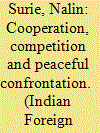

|
|
|
|
|
| Publication |
2014.
|
| Summary/Abstract |
The India?China relationship is already not a zero sum game. The potential for collaboration to mutual benefit though is much greater whether from the perspective of learning from each other's socio economic programs and successes, for bilateral economic relations or cooperation in regional and international programs. However, for this to be realised in greater and greater measure will require the development of much greater mutual trust and a mindset change, especially in our largest neighbour
|
|
|
|
|
|
|
|
|
|
|
|
|
|
|
|
| 2 |
ID:
086173
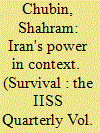

|
|
|
|
|
| Publication |
2009.
|
| Summary/Abstract |
Iran-US relations - strained at the best of times since the 1979 Iranian revolution - have never been worse than during the past six years, due to the much more intense interaction between the two states since the revelations about Iran's nuclear ambitions and the United States' invasion of Iraq. The United States sees Iran as a potential strategic rival, while Tehran views the American presence in the Middle East as a potential existential threat. This has led to zero-sum thinking and has raised the stakes correspondingly. In the process there has been an inflation of the Iranian threat, which is poorly understood and often exaggerated. Depicting Iran as a military threat obscures the real political threat the country poses to its region; Iran's regional behaviour has been neglected and overshadowed by the contentious nuclear issue. However, it is precisely Iran's behaviour and goals which feed concerns about its nuclear ambitions.
It is important to put the Iranian threat in context. In recent years, what was largely a bilateral rivalry between Iran and the United States has become displaced and expanded throughout the region: Palestine, Syria, Lebanon, Iraq and the Gulf states have all been affected by the growing tension, and there are signs that Iranian influence is becoming stronger in these areas. Iran's more active and effective diplomacy in the Middle East is due to the conjunction of three separate trends, all of which are reversible. The first is the emergence of a permissive regional environment, hospitable to Iran's diplomacy; the second, the ascension of an ideological and hardline conservative government in Tehran, predisposed to a more activist diplomacy; and third, the oil windfall, which freed resources for seeding movements and clients supportive of Iranian goals. However, the influence that has accrued to Iran as a result of these trends is transitory and precarious, and there are constraints on Iran becoming a regional superpower.
|
|
|
|
|
|
|
|
|
|
|
|
|
|
|
|
| 3 |
ID:
133089
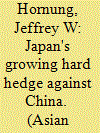

|
|
|
|
|
| Publication |
2014.
|
| Summary/Abstract |
As China accumulates more power, Japan is often overlooked as being capable of affecting China's continued trajectory because of material differences and narratives of Japan being a reactive state. Yet, Beijing's strategic planning cannot ignore Tokyo because Japan has the ability to affect the region's security environment. Feeling its presence and influence becoming relatively smaller, Tokyo has been increasingly proactive in its effort to expand its strategic space and shape the regional environment in ways conducive to its interests. A review of Japan's approach to China since 1972 reveals that it has shifted away from its traditional engagement policy toward first a soft hedge, followed by a harder hedge that continues to this day. Today's mix of partnerships and capabilities enable Japan to complicate China's freedom of action and frustrate its continued rise.
|
|
|
|
|
|
|
|
|
|
|
|
|
|
|
|
| 4 |
ID:
125382
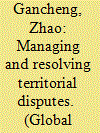

|
|
|
|
|
| Publication |
2013.
|
| Summary/Abstract |
Territorial disputes between China and some of its neighbors are of the most spectacular issues in the region. there are deep concerns about what is going on between China, the rising power of the world arena, and the Asia-Pacific neighbors over territorial disputes and differences in maritime rights. From these ongoing disputes, these are also speculations on the real motives of relevant parties, and naturally, lot of suspicions have come up constantly, destructing the regional environment for common development.
|
|
|
|
|
|
|
|
|
|
|
|
|
|
|
|
| 5 |
ID:
142325


|
|
|
| 6 |
ID:
132927
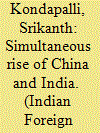

|
|
|
|
|
| Publication |
2014.
|
| Summary/Abstract |
The above brief depiction of the bilateral and multilateral interactions between India and China suggest that the new leadership in China views relations with India as being important but, overall, subservient to its equations with Washington. As China became the second largest economy in the world in 2010, and is poised to overtake the USA in GDP terms, Beijing is concerned with the possible negative outcomes of this 'power transition' - much like Germany and Japan faced in the 1930s and 1940s. For instance, Beijing has expressed concerns about USA's 'rebalancing in the Asia-Pacific', although it is the major beneficiary of the G-2. In order to cushion its rise further in a sustained manner in the international and regional orders, China is working momentarily with other emerging countries on issue-based coordination. India in turn needs to evolve policies which are based on its own self-interest; make choices that contribute to its capacity build-up; make its territorial integrity more secure through conventional and nuclear deterrence; make active efforts to re-shape the regional and international environment conducive to its rise and avoid being marginalised at a minimum, as well as protect and expand its rightful place in the international system through an inclusive and democratic architecture.
|
|
|
|
|
|
|
|
|
|
|
|
|
|
|
|
|
|
|
|
|